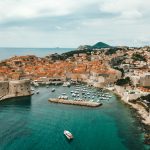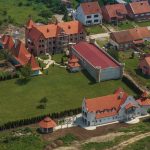The day has arrived! Hajduk Split turned 105 on February 13, 2016. In the final part of our 105 things about Hajduk, 22 turning points in history.
In the last part of this 5-part series looking at 105 things Hajduk, we look at some of the major turning points in the history of Hajduk, and try to get a window into the future, trying to learn from the past. We hope you have enjoyed our small effort to celebrate the history of this beloved club, all that remains is to wish a Happy Birthday to all Hajduk – infected people all over the world. Hajduk lives forever!
1. Resistance to the fascists
The year was 1937. Hajduk was at a point of its history where invitations were coming for friendly from some of the most important clubs in Europe. So, A.S. Roma visited Split, and it was time for Hajduk to return the visit, and travel to Rome. Before the game, the hosts asked the Hajduk delegation to salute “Romamente”, a fascist salute, which was customary, and as the hosts pointed out, all visiting teams from abroad had done so when in Rome. After a brief meeting, Hajduk’s players and delegation denied this request, pointing out that Hajduk has its traditional salute, and could not salute the Roman way, as they simply didn’t know how.
2. Hajduk in WWII, active resistance
With the Italian occupation of Split, Hajduk’s point of view remained unchanged. Its board refused all proposals made by the Italian authorities to change the club’s name and join Serie A, and decided instead to shut the club down. Some of the players and board members joined the resistance immediately, and in 1944, they all got together on the island of Vis, liberated territory, and reformed Hajduk there. Until the end of War, Hajduk represented the Yugoslav army, and played 27 games on three Continents, and travelled more than 30 000 kilometers. This put Hajduk on the map of great European clubs forever.
3. Resistance to the communists
The free spirit of Hajduk was welcomed during the war, but after the War, with a regime that was not tolerant of any differences of opinion, when offered to remain as an Army team, and move to Belgrade, refusal was not an easy decision to make. Hajduk refused, there were no retributions, as the popularity of the club was too high, but the regime founded new clubs in Belgrade, and as a consequence, Hajduk was never to be given a fair status compared to them.
4. Torcida, an eternal resistance
We already described the founding of Torcida, but to explain some of the events in the future of this point in time, one has to mention that the founders of Torcida were prosecuted by the authorities, and the name Torcida was banned. Being so, Hajduk fans went off the grid, and started to support the club in Torcida manor, and illegally, but it was always a spread of different people, with no structure, and that is the reason why Torcida is even in modern days very different than other “firms” in Europe, which are more army organized, while Torcida is a heterogeneous group of fans.
5. Tito Kirigin and the 70s
With the regime somewhat deferring, Hajduk got a chance to shine, and did so, and how! The Golden Years were there, Tito Kirigin was strong enough within the regime to fight with Belgrade teams, and Hajduk became a continental force, and remained so for two decades.
6. New stadium
The year was 1979, Hajduk grew from being a local attraction to a big club, and the new stadium, in those days a wonder of architecture, was a logical step forward. Doubling the capacity, with modern facilities, it was just one more proof of Hajduk getting as big as its supporters always imagined it to be.
7. Reestablishment of Torcida
After President’s Josip Broz Tito departure, a moment which was marked at Poljud stadium, with 50 thousand people attending the derby game on that day, and singing together in honor of the late president, there was a breath of freedom in the air. Being so, Torcida sneaked back into the North stand and stayed there forever. This event was to play a big role in the future.
8. Modern football
It is to be noted that before the end of the 80es, there was a rule in force forbidding players to move abroad before they were 27. This being so, Yugoslav clubs were able to have strong teams, with not having to spend too much money on salaries. When this rule changed in the late 80s, everything changed, and with the introduction of the Bosman rule in the early 90s, the days of modern football started, leaving Hajduk, and many traditional clubs in Europe, behind. Things changed in Hajduk offices, as many people saw an opportunity fora quick buck, and suddenly, shady characters appeared in the club, and managers took over, becoming more important than coaches and players alike.
9. Tear gas
In those days, Torcida didn’t help. Those were days of hooliganism in Europe, and parts or Torcida wanted to make their mark on this scene. With some bizarre incidents, including slaughtering a rooster (a symbol of Spurs) before the Tottenham game, and activating a tear gas bomb at the Olympique Marseille game, they earned Hajduk heavy suspensions by UEFA, taking the club even more backward.
10. Return of the emblem
It was a legitimate thing to do, but it was not done in the manor of a big club, as Hajduk wanted to be. The Hajduk board was not being brave enough to make the decision to remove the star from the Hajduk official emblem, and they sent the team to Australian tour, so the players decided to remove it themselves, as supporters were already displaying only the original one, with the Croatian national emblem.
11. Burning the flag
Hajduk’s descent was evident, but it was not the biggest problem for the supporters, as the Homeland War was imminent. Yugoslavia was falling apart, the first fights were happening in stadiums, and lots of Torcida members were at Maksimir in May 1990, when the first big fight between Serbian and Croatian fans occurred. In September, Partizan was a guest at Poljud, and it was not a game which finished. The crowd invaded the pitch, burned the Yugoslav banner, and raised the Croatian one instead. It was clear that bigger things than football were taking place, and that is why Hajduk’s win in Cup finals in ’91 against Red Star is celebrated as probably the most important one ever.
12. Politicians taking over
With the Homeland War going on, football was not the most important thing, but the Croatian league started, and Hajduk had a brilliant new generation of players, got its hands on first Championship title, and it was a sight Hajduk supporters expected to see more in the future, as Hajduk was always somewhat better Dinamo in the past, and other clubs in Croatia not being even near that level. But, Franjo Tuđman, first Croatian president, had other ideas. He was passionate about football and had an idea to change Dinamo into a national club, changing even its name, and bringing all the best players to Zagreb. Hajduk had some more triumphs during the war, but after the war, it has become more difficult. Hajduk was led by people from Tuđman’s party, and they lacked the will to stand up to his plans in force.
13. Maccabization
Dinamo was named Croatia, and not only the wealth was directed towards Zagreb, but the football association was designed to be in service of that one club. This is a matter that is fully in power even in nowadays, with the Mamić family exploiting the structure of the sport established in the nineties.
14. Conspiracy theories
As this all was not enough, Hajduk was in hands of incompetent, or as some conspiracy theories say, even crooked people. One conspiracy theory says that the crucial game for Hajduk’s descent, the loss to Panathinaikos in the Champion’s League qualifiers, a year after reaching the quarterfinals, was a fixed one. Not getting into that, it is a fact Hajduk lost that game, and missed a chance to ensure enough money to keep the strong team it had in the time, and it was downhill from there.
15. Faust
With the death of President Tuđman, things changed for a brief time, and Hajduk won a couple of titles, but, as will be clear in the future years, it was a contract with the devil, as many affairs occurred during that time, shady characters were in force, and the price for those titles is still being paid to this day.
16. Reorganisation
With Hajduk facing liquidation because of financial problems, politicians once again used Hajduk as an object to gain popularity. They ordered the transformation of Hajduk into a Joint Stock Company, turning Hajduk’s debts to stocks, and directing big companies to invest money in this new project. After that, Hajduk was given to the hands of local politicians once again, and they continued to rule the club, in the same manner as before with even worse results. Invested money was to be spent in just a couple of years and no new sources of income were established.
17. Code of conduct
It was clear that something had to be done. Torcida was growing up, some healthy forces took the lead on the north stand, and ideas for the salvation of the club started to emerge. It was a case of mockery by many, but Torcida started demanding the code of conduct to be brought to Hajduk’s statute book. The battle was a hard one, and eventually, it was introduced. This code is considered to be of the highest quality with experts claiming it would be applicable to many other organizations in Croatia.
18. 100 Years, new dawn
In all this commotion, with the board installed by politicians on one side, supporters being more organized on the other side, 100 years of Hajduk was to be celebrated. It was a sign for the future. With club missing the opportunity to earn some money, and to ensure the quality of celebration on a level Hajduk deserves, supporters staged a spectacle which had been prepared for years. Murals and wall graffiti were painted all over, the City of Split was decorated more than ever, and thousands of flares, fireworks and rockets were activated in first seconds of February 13, 2011. It was clear that Hajduk supporters had the strength to organize things better than people in suits, and a new dawn was on the horizon.

19. Our Hajduk
Hajduk supporters organized an association, somewhat of an NGO, and have been given a chance to organize elections for the club’s Board. It was the first case in Croatian sports where club members were given that chance. After the introduction of a new board, the struggle started for the salvation of the beloved club.
20. Threat of liquidation
Everyone knew things were not to go easy, and in one moment, a threat of liquidation occurred again. As city council was in session deciding whether to grant Hajduk a bail for a bank loan, Torcida staged massive demonstrations in front of the City Hall, and Hajduk was given a lifeline.
21. New Era
Hajduk is on the path to salvation, with financial problems getting solved daily, but with a lot more yet to be done. And, the same time, Hajduk is contesting unfairness inside the Croatian Football Association, with no help from the authorities that still have a blind eye for a problem. This is a battle in progress, and so far, only the strength of people’s will is on Hajduk’s side, but recent events, with the record amount of people enrolling to Hajduk give hope this is not a battle to be lost.

22. Future
This is one for the Hajduk community to decide. We cannot expect improvement to happen fast, it is a struggle that will take at least a few more years. Patience is needed, which is a virtue not often typical for people in Dalmatia, but even more so, it is a personal decision for every Hajduk fan himself. If you remain on the sideline, one can only hope this battle will be won, but if you join, you can help speed things up ensuring Hajduk lives forever, and lives a life Hajduk fans always wanted for their beloved club.







